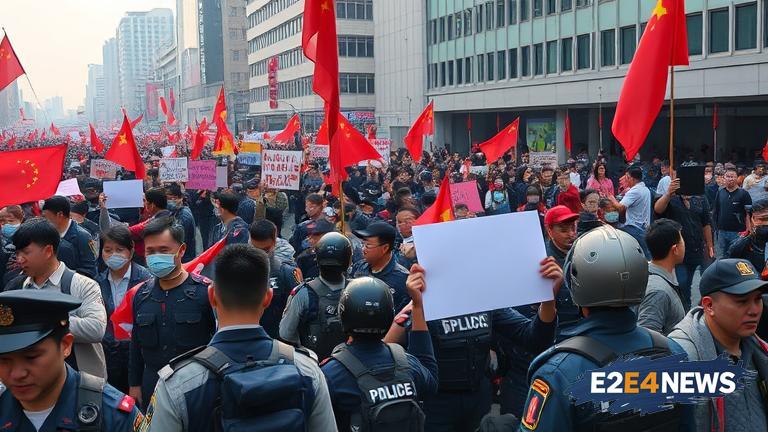A recent bullying case in China has sparked widespread outrage and protests across the country, with thousands of people taking to the streets to demonstrate against a police crackdown on the incident. The case, which involved a group of teenagers bullying a younger student, was widely reported on social media and sparked a national conversation about bullying and police accountability. Despite the outrage, police in China have been accused of cracking down on protesters and suppressing free speech. The protests, which have been ongoing for several days, have drawn attention to the country’s human rights record and the need for greater accountability and transparency. The Chinese government has faced criticism for its handling of the case, with many calling for greater action to be taken against bullying and harassment. The protests have also highlighted the growing discontent among young people in China, who are increasingly speaking out against social injustices and demanding greater freedoms. The case has sparked a national debate about the need for greater support and resources for victims of bullying, as well as the need for greater accountability and consequences for those who engage in bullying behavior. The Chinese government has announced plans to increase funding for anti-bullying initiatives and to implement new measures to prevent bullying in schools. However, many protesters have expressed skepticism about the government’s commitment to addressing the issue, citing a lack of concrete action and a history of suppressing dissent. The protests have been largely peaceful, but there have been reports of clashes between protesters and police. The Chinese government has warned against further protests, citing the need to maintain social order and stability. Despite the warnings, protesters have vowed to continue demonstrating until their demands are met. The case has sparked international attention, with human rights groups and foreign governments calling on China to respect the rights of protesters and to take greater action to address bullying and harassment. The Chinese government has faced criticism for its human rights record, including its treatment of minority groups and its suppression of free speech. The protests have highlighted the growing tensions between the Chinese government and its citizens, who are increasingly demanding greater freedoms and accountability. The case has also sparked a national conversation about the need for greater support and resources for mental health, with many calling for increased funding and access to counseling services. The Chinese government has announced plans to increase funding for mental health initiatives, but many protesters have expressed skepticism about the government’s commitment to addressing the issue. The protests have been largely driven by young people, who are increasingly using social media to mobilize and organize. The case has sparked a national debate about the role of social media in promoting social justice and accountability. The Chinese government has faced criticism for its attempts to suppress free speech and limit access to information, including its censorship of social media platforms. The protests have highlighted the growing importance of social media in promoting social change and mobilizing public opinion. The case has also sparked a national conversation about the need for greater accountability and transparency in government, with many calling for increased oversight and scrutiny of government actions. The Chinese government has faced criticism for its lack of transparency and accountability, including its handling of the bullying case. The protests have been a major test of the Chinese government’s commitment to human rights and the rule of law, with many watching to see how the government will respond to the demands of protesters.





